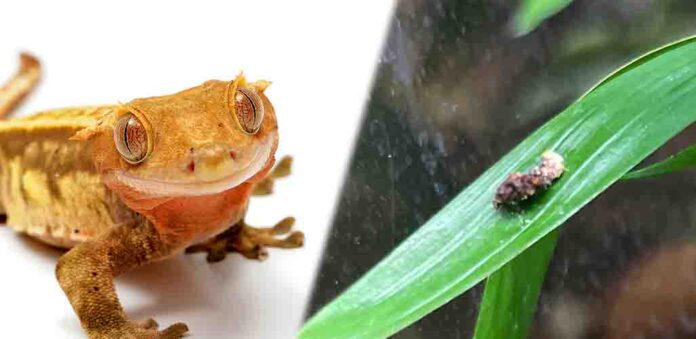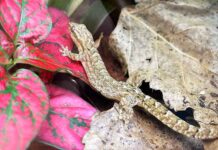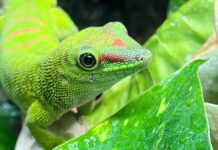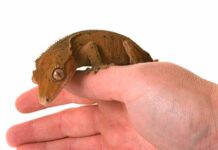Gecko poop is usually a small damp cylinder, about ¼ of an inch long, and accompanied by a smaller quantity of solid white urate. Changes in the color or texture of your gecko’s poop could be a symptom of an underlying health problem, or a sign that some aspect of their care could be improved. Many geckos leave their poop in a long trail down the glass side of their terrarium. This will appear at first glance like a dull slug trail with a small brown and white poop at the end. If you have a bioactive enclosure then your springtails and isopods will clear up the brown and white gecko poop and urates, but you’ll still need to wipe the glass down with reptile safe spray.
Contents
- Do lizards poop?
- What does gecko poop look like?
- Do lizard feces smell?
- How often do geckos poop?
- Do geckos eat their poop?
- Do geckos pee?
- What does white or gray gecko poop mean?
- What does yellow or green gecko lizard poop mean?
- Dealing with soft or runny gecko poop
- Gecko pooping problems: constipation and impaction
- Promoting healthy lizard pooping habits
Welcome to our complete guide to gecko poop! We’ll answer all your questions, from ‘what does lizard poop look like?’ to ‘is my gecko’s poop normal?’
Luckily, like lots of pets which originally inhabited hot climates, adult geckos’ poop is usually small, dry, low-odor and inoffensive to deal with. Knowing what to expect, and what changes to be concerned about, is an important way of looking after your gecko’s health.
Do lizards poop?
All animals poop, from the biggest blue whale to the tiniest yellow-headed day gecko. The need to get rid of solid waste material leftover from the digestive process is universal. But as we’re going to see, gecko pooping habits have adapted over thousands of years to improve their chances of survival in hot and dry climates. So if you’re not familiar with lizard poop already, it’s important to make sure you know what to expect, and recognize when something isn’t right.
What does gecko poop look like?
Geckos are among the world’s smallest lizard species, so it should come as no surprise (but maybe welcome news) that their poop is small too. Adult gecko poop is usually no more than ¼ of an inch long, and it looks like a small cigar. Geckos are adapted to produce poop with very low moisture content, to conserve water in very dry habitats. So their poop is usually damp, but only just, and dries out quickly in the warm environment of their tank.
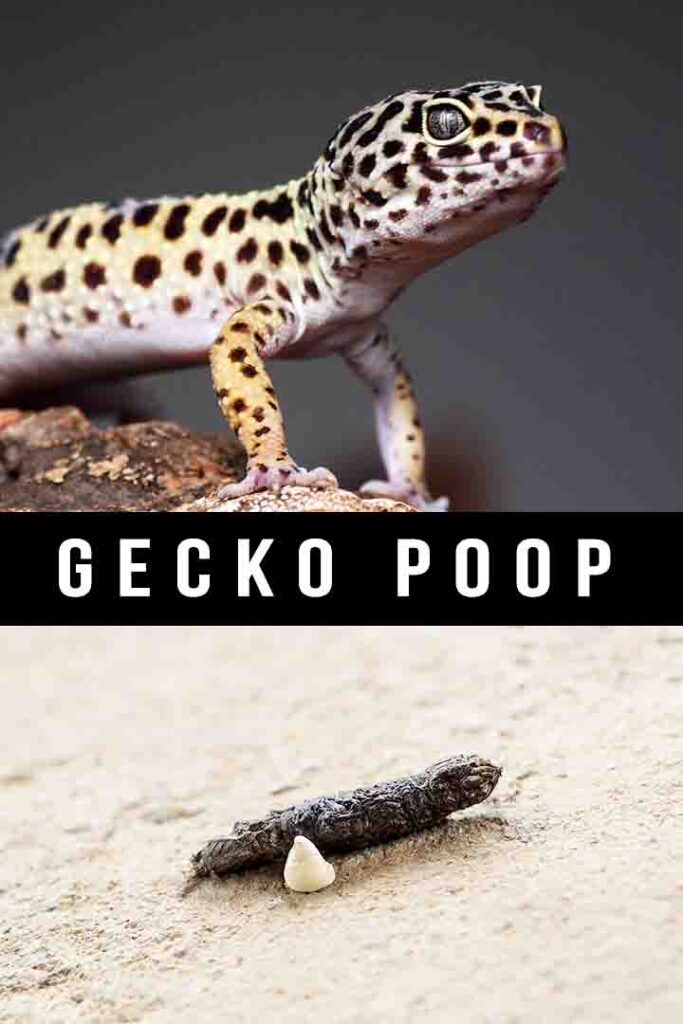
Gecko poop is usually mid to dark brown, but the color can vary depending on their diet, and individual differences in how quickly their digestive system operates. Poop gets darker the longer it hangs around in the digestive tract. So young lizards and lizards with faster than average digestion will produce lighter brown poop than lizards with a naturally slower than average digestion.
Do geckos pee?
Yes, but not in the way that we’re used to! Rather than liquid pee, geckos produce a solid white waste matter called urate. Urates are usually expelled at the same time as poop – they look like a small white blob next to the poop itself. The gecko poop images in this article will give you a clear idea of what to look for. Geckos make solid urates in order to conserve water. The normal color for them is white, and yellow urates are a sign of dehydration.
Do lizard feces smell?
Since gecko poop and pee are both solid, small, and dry, their smell is usually pretty mild and inoffensive. Some foods – like wax worms, which are high in fat – can make them more pungent. Runny poop with a strong foul odor can also be a sign that something is wrong with your gecko’s health – we’ll come back to that in a moment.
How often do geckos poop?
How often geckos poop is regulated by how often they eat. And how often they need to eat depends on how old they are. Juvenile geckos who are still growing need to eat every day. Since they’re eating frequently, and their digestive system is still immature, they tend to poop once or more per day. Up to five times a day is normal for a gecko under a month old! As they grow up, your gecko will start eating every other day, and eventually every two to three days. At this point it’s normal for them to only poop every two to three days as well.
Do geckos eat their poop?
Geckos don’t usually eat their poop. If they do, it could be a sign that their diet is lacking in either quality or quantity. As a rule of thumb, at each meal adult geckos need to eat two insects for every inch long they measure between the base of their tail and the tip of their nose – and each of those insects should be about equal to the space between your gecko’s eyes, but no wider. Fully insectivorous geckos (including leopard geckos) will be happy with a mix of locusts, crickets, mealworms, silkworms, and occasional waxworms. Crested, mourning and giant geckos also need some fruit in their diet.
One reason geckos may resort to eating their own poop is if their prey hasn’t been gut loaded before serving. Gut loading means giving live prey fresh produce like leafy green veg to eat for a day before they are offered to your gecko. This means their stomachs will be full of important vitamins and minerals which your gecko ass needs to receive.
What does white or gray gecko poop mean?
Gecko feces are usually dark in color, and white or gray matter in their poop is usually the remains of shed skin that they have eaten. It’s thought that geckos may eat their shed skin for three reasons:
- To recover the nutrients from it, rather than discarding them.
- To remove clues which will give away their presence to predators.
- And to keep their habitat clean and hygienic.
So evidence of white or gray shed skin in your gecko’s poop is not something to worry about.
What does yellow or green gecko lizard poop mean?
If your gecko’s poop changes to a green or yellow color, it’s a sign of undigested bile. Bile is a greenish yellow substance produced by the liver to help breakdown fats. It changes from yellow to green to brown to black as it travels along the gut. If it’s still yellow or green when it leaves the body, it could be a sign that there is too much fat in their diet (usually due to eating too many waxworms). Or it could be evidence of diarrhea caused by gut parasites such as worms. If reducing the number of fatty snacks in their diet doesn’t fix the problem, they need to see a veterinarian.
You should also consult a vet if your gecko passes yellow or green mucus with their poop. Mucus in the digestive tract is a sign of inflammation due to parasites, infections or dehydration.
Dealing with soft or runny gecko poop
It’s normal for young geckos to have slightly softer poop than adult geckos. This reflects the fact that their digestive system is still immature, meaning it is shorter and perhaps not fully stocked with beneficial bacteria yet. But, their poop should only be soft, not watery. If a gecko of any age starts passing watery poop, or their poop is softer than usual and they also have any of the following symptoms, they need to see a vet:
- Pooping more frequently
- Poop is significantly more foul-smelling
- Lethargic
- Loss of appetite
- Showing signs of dehydration such as weakness, sunken eyes, wrinkled skin, or a skinny tail.
Since geckos are normally clean and tidy animals, pooping inside their hide could also be a sign that they have either lost control of their bowels, or felt too unwell to move away. Diarrhea is usually caused by one of two things:
- Impaction. Impaction is when geckos eat unsuitable things (like overly large prey, or substrate from their tank) and their digestive system gets blocked. Diarrhea is liquid matter in the gut seeping past the blockage.
- Parasitic infection. Geckos are prone to both pinworm and protozoan parasites. In fact a low level of worms in their stool is considered normal, and not to worry about, unless it is causing any of the symptoms above as well.
Gecko pooping problems: constipation
All animals poop, and all animals can experience the discomfort of not being able to poop. Constipation in geckos can be caused by
- A too cold habitat. Or inappropriate heating. Geckos’ digestive systems rely on ambient warmth to function properly, and if they are too cold, they can’t digest food efficiently – which could ultimately lead to malnourishment. Geckos are adapted to absorb heat through the underside of their body by basking on sun-warmed rocks. So their tank also needs to be heated from below too.
- Improper diet. Feeding your gecko the wrong kind of diet can lead to digestive problems.
- Dehydration. Geckos need moisture in their diet to keep material moving along. Dehydration can lead to overly dry fecal matter getting stuck, and also muscle weakness making it hard for geckos to expel their poop.
- Impaction.
If your gecko hasn’t pooped for over a week, arrange an urgent appointment with a veterinarian.
Undigested food in gecko poop
Another common experience of gecko owners is finding droppings with easily identifiable undigested prey in them. This can mean two things:
- Their habitat is too cold.
- Their prey is too large.
Double check that you’re getting these things right, and make adjustments as necessary.
Cleaning up gecko poop
Geckos are fastidious little critters, so remove poop, urates and soiled substrate from their tank regularly. Lots of geckos adopt a preferred toilet area in their habitat. For terrestrial species like leopard geckos and African fat tailed geckos, it’s likely to be on the floor of their tank. If you can cover that spot with a square of paper towel, you can clean up easily by replacing the towel. For arboreal species such as crested geckos and tokays, their poop is more likely to end up somewhere on their tank furnishings, or even stuck to the glass. Remove it regularly, and wipe away unsightly smears with a reptile-safe disinfectant.
Summary – Promoting healthy lizard pooping habits
Slightly soft daily stools are normal in juvenile geckos, but by adulthood gecko poop should be firm, dark and only slightly damp. Most adult geckos only poop every 2 or 3 days. A lot of the poop problems veterinarians see in geckos are triggered by simple husbandry mistakes. Changes in poop can be triggered by
- a too cold habitat
- a change in the size, quality or quantity of their prey
- ingesting substrate from their tank
- and dehydration – even desert species should have access to clean drinking water.
If you can rule these out, it’s possible that a parasitic infection has changed your gecko’s pooping habits. Arrange to see a vet as soon as possible. Also take your gecko to a vet if they haven’t pooped in more than a week.
More gecko resources
- Crested Gecko Having Trouble Climbing
- Mourning Gecko Breed Traits and Care
- Albino Leopard Gecko Morphs and Care Needs
- Viper Gecko Breed Information and Care Guide
- Do Crested Geckos Need UVB to Survive and Thrive?
- Is A Pet Gecko The Right Choice For You?
References
Bowers. How to set up a vivarium: maintaining the health and welfare of reptiles. The Veterinary Nurse. 2013.
Kischinovsky et al. Husbandry & Nutrition. Reptile Medicine and Surgery in Clinical Practice. 2017.
Kubiak. Management, care and common conditions of leopard geckos. Vet Times. 2011.
Kubiak. Geckos. Handbook of Exotic Pet Medicine. 2020.
Reynolds & Tyrell. Dealing with reptile parasites in general practice. Veterinary Nursing Journal. 2007.

